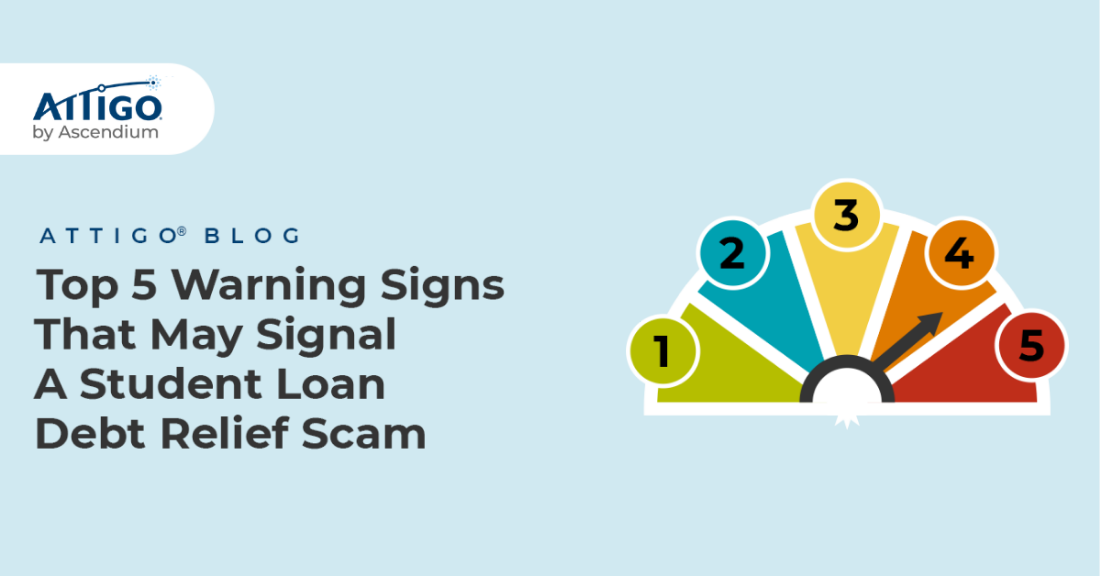Top 5 Warning Signs that May Signal A Student Loan Debt Relief Scam

The U.S. Department of Education's student loan payment suspension will end on May 1, 2022. Millions will reenter repayment at the same time and it will put a strain on loan servicers and the federal servicing system. It will undoubtedly cause confusion for many student loan borrowers. This confusion will create the prime conditions for unscrupulous companies that do not have a borrower's best interests at heart. This blog shares top warning signs to share with the student loan borrowers in your life, so they can protect themselves from a possible student debt relief scam.
As a reminder, borrowers can learn about their own federal student loans from their student loan servicer and at the National Student Loan Data System or studentaid.gov. The latter two government websites show borrowers their federal loans. Any private loans they might have can be identified by obtaining an annual free credit report.
In addition to understanding how student loans work, here are some warning signs to look for that may signal a scam.
| 1. Asks for upfront fees. |
 It’s illegal for debt relief service companies to charge someone before they help them.
It’s illegal for debt relief service companies to charge someone before they help them.
| 2. Promises fast loan forgiveness or a guaranteed balance reduction. |
 Loan forgiveness takes many years and is only for borrowers who meet specific qualifications. If a company promises quick loan forgiveness or a drastic balance reduction before understanding a borrower’s unique situation, look out!
Loan forgiveness takes many years and is only for borrowers who meet specific qualifications. If a company promises quick loan forgiveness or a drastic balance reduction before understanding a borrower’s unique situation, look out!
| 3. Uses names and seals that seem official. |
 Companies may use names, seals and logos that suggest they are affiliated with the U.S. Department of Education or other government entities or programs. Companies may say or imply they have access to certain special repayment plans or forgiveness programs when they don’t. The Department of Education has great information on their website and contracted servicers to help keep you informed.
Companies may use names, seals and logos that suggest they are affiliated with the U.S. Department of Education or other government entities or programs. Companies may say or imply they have access to certain special repayment plans or forgiveness programs when they don’t. The Department of Education has great information on their website and contracted servicers to help keep you informed.
| 4. Rushes decision making. |
 Scammers count on you not having all the information necessary to make an informed decision. They rely on salespeople to close deals, which means not giving you a chance to reflect or research. If a company states that certain options are expiring or pressures you into making immediate payments or signing up right away, be wary.
Scammers count on you not having all the information necessary to make an informed decision. They rely on salespeople to close deals, which means not giving you a chance to reflect or research. If a company states that certain options are expiring or pressures you into making immediate payments or signing up right away, be wary.
| 5. Asks for your FSA ID. |
 If a company claims they need your Federal Student Aid (FSA) ID to help them help you, don't provide it. Dishonest people could use that information to take control of your account and personal information.
If a company claims they need your Federal Student Aid (FSA) ID to help them help you, don't provide it. Dishonest people could use that information to take control of your account and personal information.
What to Do
If you believe you've been contacted or swindled by a scam, report it to the Federal Trade Commission (FTC) and your State Attorney General. The FTC and State Attorneys General have sued over a dozen student debt relief companies. They rely on complaints from borrowers to understand who the bad actors are and how they operate. They can close down companies that harm borrowers and even get refunds back to those who have been scammed.
You should also reach out to your servicer to make sure your loans are in good standing and to ask questions about your options.
Encourage the Borrower in Your Life
Understanding and taking ownership over their student loans can be the first step to understanding and mastering all of their finances. For many, student loans are one of if not the first significant financial obligation they'll have. If they decide to care and know more about their loans than anyone else, they'll be able to effortlessly judge whether someone’s advice is good or bad, and to identify scams or questionable companies and respond appropriately. If they can do this with their student loans, they can do it with any financial obligation or instrument, which will serve them throughout their life.
You can help student loan borrowers realize this important lesson: no one should care or know more about their money than they do.



